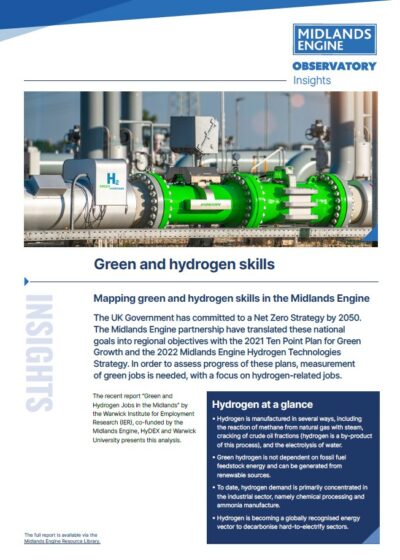Skills
Understanding hydrogen skills
A guide to unlocking hydrogen skills for local authorities and local leaders
01 Importance
Why are hydrogen skills becoming increasingly important?
The ambitious target for growth of the UK hydrogen sector as set out in the Hydrogen Strategy will require the rapid development of critical supply chain businesses and with it the skills necessary to establish and upskill the workforce.
The Hydrogen Strategy provides a timeline for supporting policy and activity to enable the expansion of the hydrogen sector in the 2030s as shown in the diagram below:
Developing the hydrogen sector will need the utilisation of existing skills in energy and other sectors, such as the oil and gas industry and the off-shore wind industry and will also need new skills to be developed and made available at the right time and place. The development of the hydrogen sector will help both retain and create new high-quality green jobs.
UK net-zero commitments
The UK net-zero strategy also highlights the government’s key commitments for the development of green jobs, skills and industries, all of which applies to the hydrogen sector. The commitments are listed here.
Similarly in the EU, the GreenSkillsforH2 project is aiming to design and implement a hydrogen skills strategy to meet the future demand for resources in the sector, develop rollout vocational training, create a European hydrogen skills community and a hydrogen skills alliance.
02 Required Skills
What are the required skills for the hydrogen economy?
The hydrogen sector requires a wide range of interdisciplinary knowledge and skills. These include sciences, such as; materials, chemistry and electrochemistry, engineering such as chemical, mechanical and civil, human science, project management and financing, strategy and policy.
The Hydrogen Skills Alliance led by the High Value Manufacturing Catapult, aims to build the workforce required for the growth of the hydrogen sector in the UK. The alliance has been working with stakeholders to identify skills required by the industry, and ensuring training programmes align with the needs in terms of content and scale. The Hydrogen Skill Alliance offers free online hydrogen training modules.
Hydrogen skills: themes
Hydrogen skills can be categorised under 7 main themes:
03 Training Courses
Education and training institutions in the Midlands have been at the forefront of developing hydrogen training programmes, from leading Centres for Doctoral Training (CDT) programmes in Hydrogen and fuel cells, to developing and running postgraduate, undergraduate and technician training programmes, and CPD modules as shown below.
Skills Acquisition Methods
| Undergraduate courses |
| Postgraduate programmes |
| Technician training |
| CDT programmes |
Courses need to acquire H2 skills
| Renewable Energy Systems |
| Hydrogen for Civil Aviation: H2 in the Aircraft
Biofuels and Biorefining Future Vehicle Technologies |
| Various hydrogen upskilling courses |
| PhD Programmes |
Training Institutions offering H2 skills
In addition to academic and accredited modules, HyDEX is offering hydrogen skills modules for industry professionals through lecture series and webinars to enable knowledge sharing and developing required knowledge in the industry. Providers such as the Institutes of Technology are also looking at developing hydrogen courses.
Finally, Hydrogen seminars and conferences offer a great opportunity for knowledge sharing and networking, enabling collaboration and skills development in the region. The annual hydrogen conference which has been held in Birmingham over the last 20 years has become an important event for the UK hydrogen community in which stakeholders get an update on the state of development of policies, projects and technologies in the UK and worldwide.
The Midlands has an opportunity to become the UK’s centre for training and retraining of workforce required for the hydrogen economy. The wide range of courses already developed and running in the Midlands highlight the depth and breadth of the knowledge base that can be tapped into.
04 Support
How can local authorities support hydrogen skills in the Midlands?
Hydrogen promises to be a significant contributor to the future fuels mix for both domestic and commercial consumers. Local Authority leadership must look to promote and enable a transition which ensures sustainability and wellbeing, future proofing of services and infrastructure, and support an ecosystem attractive for investment, to retain existing industries and stimulate targeted sustainable growth.
Considerations for local authorities
Creating a hydrogen vision and strategy
for the region based on credible evidence which lays out strategic objectives specific to hydrogen training and skills development.
Setting up virtual hubs, events and taskforces
to help foster knowledge sharing and collaboration between stakeholders from industry, academia and public sector.
Supporting scale up of technical training programmes
at technical colleges and universities.
Supporting local industry and supply chains
to identify skills gap and retrain their staff to be ready for getting involved in hydrogen project opportunities.


